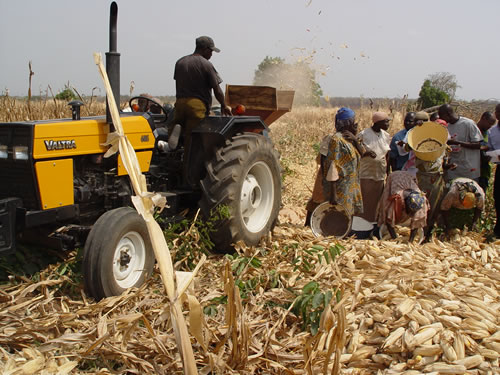Dr Manson Nwafor, Policy Analyst, ECOWAS Commission, has said that the New Alliance would continue to support Africa’s quest toward achieving food sufficiency.
Nwafor stated this in a document of New Alliance-Grow Africa 2015 and 2016 Nigeria Report and made available to the News Agency of Nigeria (NAN) in Abuja on Friday.
He said that the partnership agreement among the government, private sector and development partners on targeted actions was needed to promote investment in agriculture.
“At present, 10 African countries have joined the initiative: Nigeria, Burkina Faso, Côte D’Ivoire, Ethiopia, Ghana, Mozambique, Tanzania, Benin, Malawi, and Senegal but Nigeria joined the initiative in 2013.
“In Nigeria’s new alliance agreement, the government was committed to 13 major policy actions in the areas of seed and fertiliser, Bank of Agriculture, nutrition, commodity exchange, power availability among others.
“Development Partners committed to predictable funding of USD 500 million mostly over the 2013 to 2016 period.
“The private sector made commitments in the areas of agriculture investment (USD 3.8 billion) in the 2013 to 2023 period, “ he said.
NAN reports that the New Alliance is a partnership agreement among the Federal Government, private sector and development partners, on targeted actions needed to promote agricultural investment in agriculture.
Nwafor stated that the overview progress of the New Alliance by government which was expected to have completed 26 tasks by June 2016 only did nine tasks, representing 35 per cent achievement rate.
“Development partners are expected to have provided US$ 420 million in aid by 2016 but have provided US$ 294 million, which is 70 per cent achievement rate.
“Private sector was also expected to have invested 1.1 billion dollars as at 2016 but have invested 1.4 billion dollars as at 2016, which is 123 per cent achievement rate. “
He identified the challenges facing farmers and investors as low density and coverage of Nigeria by functional agro-dealers and financial capacity of participating agro-dealers.
Other challenges include: “Low participation and slow provision of funding under the sovereign guarantee arrangement by banks to agro-dealers.
“Upstream suppliers (producers and importers) of fertiliser and seeds could not meet consistently the demand for inputs at all the redemption sites.
“The slow space of legislation on virtually all the key policies has affected timely implementation of most of the activities under the New Alliance commitments and budgetary deficits, “ he said.
Policy analyst urged the government not to relent in implementing its commitments and taking bold steps to address these challenges to make food available for the citizenry.



Leave a Reply